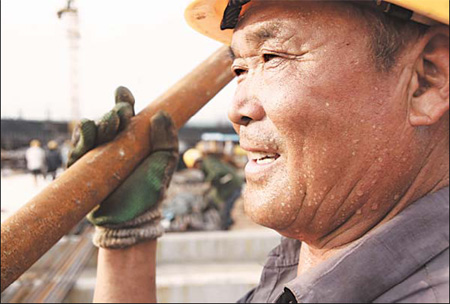Under a merciless sun, life goes on
Cold comfort
While workers sweat it out on construction sites, 48-year-old Duan Chengling spends his days riding a tricycle usually piled high with plastic bottles, cardboard and used clothes.
 |
|
A worker carries building material on a construction site on Tuesday in Nanyang, Henan province, where the temperature reached 40 C. |
He regularly cycles about 4 km to a recycling center in Xiaoying, near Beijing's North 4th Ring Road, earning about 80 yuan for each trip.
"In summer I can collect more drink bottles," said the Henan native, whose skin has been tanned a dark brown.
Duan has been collecting trash to recycle for the last six years but only works in the morning. As his apartment has no air-conditioning, he and his wife spend the afternoon under a bridge.
"It's much cooler there, so we stay until about midnight," he said with a broad smile. "I think the hottest days are yet to come, though."
For Ding Yi, cooling off under a bridge sounds like heaven compared to standing over a blazing hot stove for 10 hours a day.
"The temperature outside may be 40 C but in the kitchen it's at least 45," said the 20-year-old chef at Tian Zi He hotpot restaurant in Beijing. "Most restaurants don't have air conditioners in the kitchen unless they're in fancy hotels."
Ding shares the hot, smoky 10-square-meter kitchen with four other cooks. An old ceiling fan spins just a few feet above their heads but blows only hot air back at them. Sweat was streaming down the men's faces, while soaked uniforms clung uncomfortably to their backs.
"These days I can't stand to be in the kitchen," said Ding, who earns 3,000 yuan a month and has not received any extra pay due to the hot conditions. "It's like standing on an asphalt road on a blazing summer day with a pot of fire burning in front of you."
Another concern, he said, is the damage the heat wave has had on business.
"Who wants to eat hot pot in such a hot weather?" mused the cook, who explained that his restaurant, which can seat up to 200 people, is receiving less than 30 customers a day.
The extreme weather conditions have wreaked havoc across the country for the last few weeks, causing fatal accidents and affecting wildlife.
On Sunday, a shuttle bus taking nightshift workers to a steel plant in Wuxi, Jiangsu province, caught fire in a tunnel at about 11 pm. Police said 24 people were killed and 19 others injured.
Although the blaze is still under investigation, several experts quoted by the local media say the tragedy was caused by spontaneous combustion.
Earlier that day, a van also burst into flames in Xingtai, Hebei province, while in Shenzhen, Guangdong province, police and firefighters attributed an explosion at a pharmaceutical plant on Monday to extreme temperatures. No casualties were reported in either incident.
The weather has also claimed the life of three red deer at a zoo in Changsha, capital of Hunan province. The animals - native to West China's Qinghai province - died of heat stroke and a lack of water, said zoo manager Zhang Qiang.
As many as 162 climate stations under the China Meteorological Administration reported extremely high temperatures between June 1 and July 4, with 34 stations reporting record highs, according to the administration's national climate center.
Officials in Hebei, where more than 10 high temperature warnings had been issued as of Tuesday, say the drought has severely affected crops, particularly corn.
In Tai'an, Shandong province, vendors say they have had to throw away thousands of kilograms of melons every day.
"It's simply too hot out there,"
said businessman Du Yuesheng. "There's nothing we can do other than sit and watch the truckload of melons rot."
The city of Zhengzhou, capital of China's most populous province, Henan, used an all-time high of 8.76 million cubic meters of water on June 30 - equal to the amount that would be used by 88 Water Cubes (the Olympic Aquatic Center in Beijing).
Power usage also soared in Beijing, Tianjin and most parts of Central China, said officials.
 0
0 







Go to Forum >>0 Comments